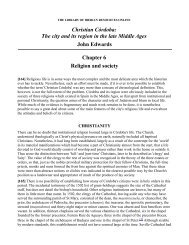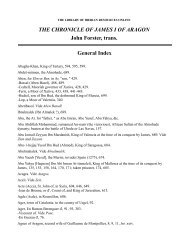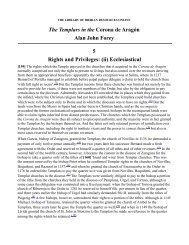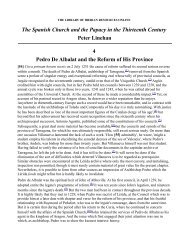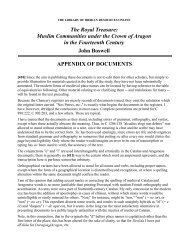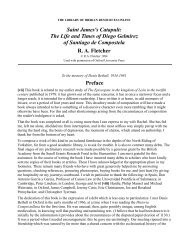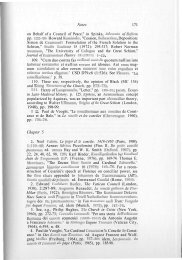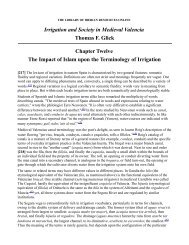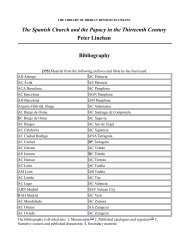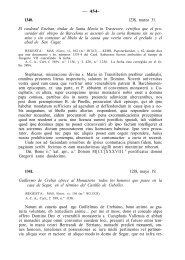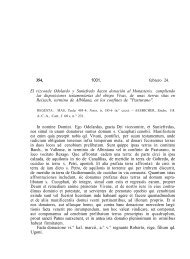PROTESTANTISM - The Library of Iberian Resources Online
PROTESTANTISM - The Library of Iberian Resources Online
PROTESTANTISM - The Library of Iberian Resources Online
You also want an ePaper? Increase the reach of your titles
YUMPU automatically turns print PDFs into web optimized ePapers that Google loves.
We have seen how difficult it was to make the Inquisition respect municipal law, and it was not likely<br />
to regard international obligations. Excuses could readily be found to bring the hated foreign heretic<br />
under its jurisdiction and, in the chronic penury <strong>of</strong> the time, the opportunity <strong>of</strong> rich confiscations was<br />
not likely to be lost sight <strong>of</strong>. In 1621 we hear <strong>of</strong> a number <strong>of</strong> Englishmen arrested in Málaga, with<br />
sequestration <strong>of</strong> property, and the same occurred in Seville, in 1622. (140) Of one case we chance to<br />
have details--that <strong>of</strong> George Penn, brother <strong>of</strong> Admiral--then Captain--Penn, and uncle <strong>of</strong> William Penn,<br />
the Founder <strong>of</strong> Pennsylvania. He was in no sense a bigoted Protestant, or he would scarce have married<br />
a Catholic wife in Flanders. He took her to Seville, where he conducted a prosperous business until<br />
1643, when he was arrested. His account <strong>of</strong> his sufferings is manifestly exaggerated though we may<br />
believe him when he says that he was tortured until he confessed all that was required <strong>of</strong> him--that he<br />
was a heretic who had married a Catholic in Antwerp, intending to take her to England and pervert her<br />
and their children from the faith. He was required to abjure in a public auto and ordered to leave Spain<br />
within three months, while his wife was taken from him and he says was married to a Spaniard. <strong>The</strong><br />
property confiscated amounted, according to disinterested appraisers, to £6000 <strong>of</strong> his own and £6000<br />
belonging to other parties. On his return to England, beggared and broken in health, he sought to obtain<br />
redress and, about 1664, Charles II appointed him envoy to Spain, to enable him to urge his claims to<br />
advantage, but being then 63 years old he did not venture to go. During the negotiations at [469]<br />
Utrecht, William Penn endeavored to obtain consideration <strong>of</strong> this case, but apparently without success.<br />
(141)<br />
<strong>The</strong> superb imperturbability <strong>of</strong> the Inquisition as to international obligations is evinced in a case<br />
occurring soon after the treaty <strong>of</strong> Munster. Paul Jerome Estagema, a citizen <strong>of</strong> Hoorn, was arrested at<br />
Alicante and tried by the Valencia tribunal. Influential people in Holland urged his release, and the<br />
Dutch ambassador, Anthony Brun, made forcible representations to the king, who wrote, September 15,<br />
1651, to the Suprema, urging a prompt decision <strong>of</strong> the case and pointing out that, under the treaty,<br />
Estagema, as a citizen <strong>of</strong> the United Provinces, was not subject to the Inquisition. <strong>The</strong> royal request<br />
was treated with absolute indifference; Ambassador Brun kept urging the matter and, on December<br />
16th, Philip repeated his application to the Suprema, and asserted the necessity <strong>of</strong> satisfying the<br />
Hollanders. <strong>The</strong>n the Suprema condescended to forward the royal letters to the tribunal, telling it to<br />
despatch the case without delay, which could readily be done as the trial had been finished on<br />
September 7th, and ordering it to report the sentence when pronounced. (142)<br />
At this period, political exigencies rendered both France and Spain desirous <strong>of</strong> an alliance with<br />
England. Don Alonso de Cardenas, the Spanish ambassador, endeavored to negotiate a treaty with<br />
Cromwell in 1653 and again in 1655, but the Protector insisted on larger toleration. In the draft <strong>of</strong> the<br />
projected treaty, Articles 22 and 35 not only repeated the previous provisions but added that<br />
Englishmen conducting business in Spain should be permitted, in their houses and ships, to perform<br />
divine service in their own manner, and to use their Bibles and other books, and that they should not be<br />
arrested for so doing or their property be sequestrated. When the treaty was submitted to Philip, he sent<br />
these articles to the Suprema for its advice, protesting that he was unalterably resolved to risk all his<br />
dominions and spill the last drop <strong>of</strong> his blood, rather than to yield anything that would be to the<br />
disservice <strong>of</strong> God, or prejudice in the least degree the purity <strong>of</strong> religion. In response to this the Suprema<br />
declared that the royal words ought to be recorded in imperishable bronze; it easily proved that by<br />
divine, canon and municipal law, a sovereign had no right [470] to permit such toleration; it quoted<br />
Gregory XV as ordering, in 1622, all rulers, under heavy penalties, to expel all heretics from their<br />
dominions, and it pointed out that heretics employed Catholic servants who would be corrupted, and<br />
that all cognizant <strong>of</strong> heresy incurred mortal sin and excommunication if they did not denounce it. <strong>The</strong>se



